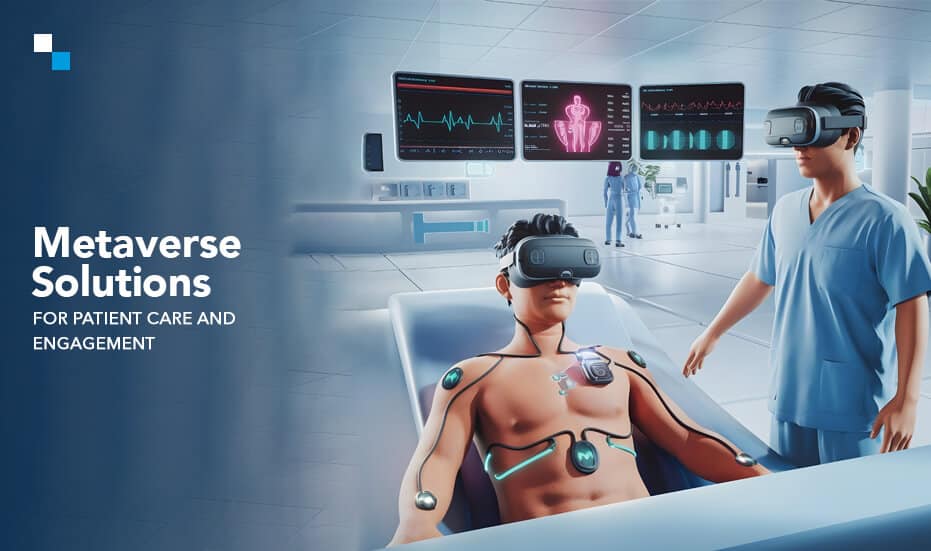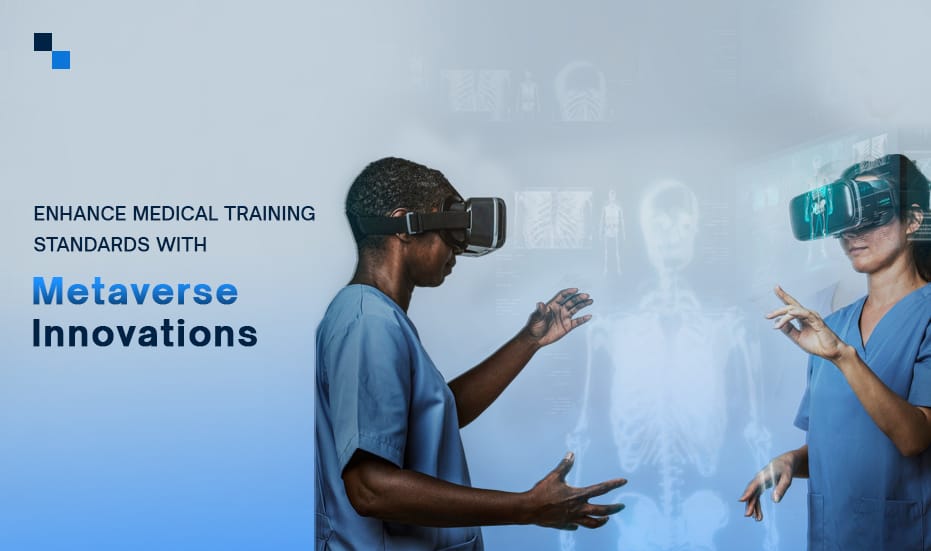
Reduce Startup Barriers with White Label Futures Trading Software in 2025
October 21, 2024
Harnessing Multi-Chain Compatibility in ICO Launchpad Development: The Future of Token Launches
October 22, 2024The Metaverse has ushered in a new era of innovation across various industries, and healthcare is no exception. The integration of VR, AR, AI, and immersive experiences is reshaping patient interactions, professional training, and overall healthcare delivery.
This article will explore the transformative applications of the Metaverse and highlight 10 groundbreaking solutions for improved medical facilities.
Understanding the Metaverse in Healthcare
The Metaverse is a collective virtual shared space that encompasses the entirety of the digital universe, merging real-world elements with interactive digital experiences. It allows users to interact within a three-dimensional environment as avatars, facilitating social connections, learning, and entertainment.
In healthcare, this concept extends to virtual patient interactions, immersive training experiences, and real-time data analysis.
The Metaverse healthcare solutions allow professionals to leverage the Metaverse for enhanced therapeutic outcomes and operational efficiency.
Current Healthcare Concerns
Healthcare inequity is a alarming concern worldwide. 15.4% of adults without insurance in the US frequently visit emergency rooms due to limited access to medical professionals. Hospitals bear the heavy financial burden of having to treat patients regardless of their financial situation due to this dependence. As a result of these costs, insurance rates rise and more people lose their coverage.
Inequality also exists in the medical field, where costly tuition keeps low-income students from enrolling. This leads to a lack of diversity among medical practitioners. In addition, handling patient data brings up issues of ownership and privacy, particularly with relation to DNA and RNA used in research. Thankfully, Metaverse Healthcare Solutions are now addressing these problems.
Metaverse Healthcare: Pioneering Solutions for Contemporary Medical Issues
1. Personalized Medical Care
The Metaverse offers innovative ways to enhance patient care through personalized virtual experiences. Patients can attend virtual consultations from home, minimizing the need for physical visits, which saves time and resources. This model can reduce healthcare costs by decreasing reliance on in-person services. Family members or caregivers can join these interactions, fostering a supportive decision-making environment.
2. Global Access to Health Service
By connecting healthcare providers and patients across geographical boundaries, the Metaverse improves access to medical services, addressing existing healthcare inequities. This enhanced connectivity promotes engagement, leading to better health outcomes for underserved populations. Remote collaboration among healthcare professionals also allows for the simulation of surgical scenarios for training, further improving healthcare delivery.
3. Innovative Approaches for Treatment
In mental health, virtual reality therapy enables patients to confront fears in controlled settings, benefiting those with anxiety or PTSD. This innovative approach can be more affordable than traditional treatments. Additionally, the Metaverse revolutionizes medical education through immersive simulations, providing future providers with hands-on experiences that develop critical thinking and problem-solving skills essential for real-world challenges.
4. Efficient Clinical Trials and Data Ownership
Utilizing web3 technologies can streamline clinical trials, addressing inefficiencies that delay medication availability and increase costs. Predictive analytics may identify potential issues early in the process, reducing the financial burden on the healthcare system. Moreover, the Metaverse offers individuals greater control over their genetic data, enhancing transparency and personal ownership, which can address concerns related to data exploitation and privacy.
Metaverse and Healthcare Professionals
Healthcare professionals gain substantial advantages from Metaverse technologies. Training in realistic, risk-free environments—such as surgery simulations—allows trainees to practice complex procedures without real-life consequences, enhancing patient safety.
Moreover, virtual communities facilitate real-time sharing of experiences and best practices, promoting continuous learning and collaboration across disciplines, from surgeons to mental health advocates. The Metaverse also supports mentorship programs, where experienced professionals guide newcomers through immersive scenarios, boosting confidence in clinical skills.
Additionally, data analysis within the Metaverse enables groundbreaking research, simulating patient scenarios and treatment outcomes to deepen understanding of diseases and improve patient care protocols.

Top 10 Metaverse Healthcare Solutions
1. Virtual Reality Patient Consultations
Virtual reality patient consultations enable healthcare providers to connect with patients in an immersive 3D environment. This innovative solution enhances the patient experience by making consultations more engaging. It can replicate face-to-face interactions while offering tools to visualize health conditions or treatment options effectively.
Furthermore, VR consultations can be particularly beneficial for patients with mobility issues or those living in remote areas, as they eliminate the need for travel and provide access to specialists who may not be available locally.
2. Augmented Reality Surgical Training
Augmented reality surgical training allows aspiring surgeons to visualize complex anatomical structures overlaid on real-life scenarios. This technology offers realistic simulations, enabling trainees to practice before involving real patients, thereby reducing risks associated with learning in a clinical setting.
AR can provide real-time feedback during training sessions, allowing trainees to correct mistakes on the spot and reinforcing learning.
By integrating AR into surgical education, institutions can better prepare their students for the challenges of the operating room, ultimately leading to improved surgical outcomes and patient safety.
3. AI-Driven Health Monitoring
AI-driven health monitoring systems integrate with the Metaverse to analyze real-time patient data, alerting healthcare professionals to potential issues.
This proactive approach allows for timely interventions based on comprehensive health metrics, ultimately improving patient safety and care outcomes. Moreover, these systems can learn from vast amounts of data over time, refining their algorithms to provide increasingly accurate predictions and alerts.
As a result, healthcare providers can focus on personalized care, addressing individual patient needs with greater precision and efficiency, which is especially crucial in managing chronic conditions.
4. Telemedicine in the Metaverse
Telemedicine in the Metaverse takes traditional remote consultations a step further by providing immersive, interactive experiences for both patients and providers.
Healthcare professionals can examine and diagnose patients using detailed 3D models and virtual tools in real-time, increasing the accuracy of assessments without the need for physical examinations.
This technology also facilitates collaboration among specialists, who can join virtual consultations from different locations, pooling their expertise to provide comprehensive care. The ability to share visual aids and simulations during these sessions enhances communication and ensures that patients receive well-rounded advice tailored to their specific conditions.
5. Virtual Health Education
Virtual health education harnesses the Metaverse to deliver interactive learning experiences to patients and medical students alike. Engaging educational modules can simulate various scenarios, enhancing retention and understanding of health-related topics while fostering a culture of continuous learning.
These virtual platforms can accommodate diverse learning styles, offering visual, auditory, and kinesthetic learning opportunities.
By creating a more inclusive educational environment, healthcare providers can ensure that all patients and students are equipped with the knowledge they need to manage their health effectively and pursue careers in the medical field.
6. Digital Therapeutics
Digital therapeutics are evidence-based solutions that leverage technology to prevent, manage, or treat medical disorders. In the Metaverse, these therapies can be delivered in engaging and immersive environments, promoting adherence to treatment protocols and enhancing therapeutic efficacy.
For example: Gamified therapy sessions can motivate patients to complete their exercises or follow their treatment plans, making the process feel less like a chore and more like an engaging activity.
This innovative approach not only improves patient outcomes but also encourages a proactive attitude towards health management, fostering long-term wellness.
7. Personalized Medicine in the Metaverse
The application of personalized medicine within the Metaverse allows for tailored healthcare solutions based on individual patient data. By analyzing genetic, environmental, and lifestyle factors within an immersive environment, healthcare providers can develop precise treatment plans that cater specifically to individual needs.
This level of customization not only enhances treatment effectiveness but also empowers patients by involving them in their own healthcare journey. As patients gain insights into their unique health profiles, they can make informed lifestyle choices that align with their personalized treatment strategies, leading to improved overall health outcomes.
8. Mental Health Support in Virtual Environments
Virtual environments within the Metaverse offer unique opportunities for mental health support, including therapy sessions conducted in calming, immersive settings.
These virtual spaces can reduce anxiety and create a sense of safety, fostering open communication and effective therapeutic relationships.
The anonymity of virtual interactions can encourage individuals to seek help who might otherwise hesitate to do so in traditional settings. This helps to reach broader audience, providing essential support to those in need, regardless of geographical barriers.
9. Virtual Reality Rehabilitation
Virtual reality rehabilitation utilizes immersive technology for physical therapy and rehabilitation, making recovery engaging for patients.
VR exercises can be tailored to individual capabilities, enhancing motivation and participation in the recovery process while tracking progress in real-time.
This approach not only makes rehabilitation more enjoyable but also allows for the incorporation of gamification elements, which can further incentivize patients to adhere to their therapy regimens.
10. AI-Powered Predictive Analytics
AI-powered predictive analytics in the Metaverse analyze health trends and patient data to forecast potential health issues before they arise.
With AI, healthcare providers can implement preventive measures to reduce the occurrence of chronic diseases, ultimately improving population health outcomes.
Also, the analytics can identify at-risk populations, allowing for targeted interventions and resource allocation.

Technical Specifications and Accessibility in Metaverse Healthcare
Software Requirements:
Key platforms like Unity and Unreal Engine facilitate immersive healthcare simulations with advanced 3D rendering and physics. SDKs, such as Oculus SDK and ARKit, ensure compatibility across devices. Telemedicine platforms like XRHealth enable remote consultations, while simulation software like SimX enhances medical training through interactive scenarios.
Hardware Requirements:
High-end VR headsets (e.g., Oculus Rift, HTC Vive) and standalone devices like Oculus Quest 2 support detailed simulations. Peripheral devices, such as Haptic Gloves and motion tracking systems, enhance realism.
Network Requirements:
High-speed internet and low-latency networks, particularly 5G, are essential for seamless VR/AR interactions. Cloud services provide scalability, while edge computing improves data processing efficiency.
Accessibility Considerations:
User-friendly interfaces, voice controls, and adaptive technologies ensure usability for all. Cost-effective solutions and comprehensive training promote widespread adoption, while compliance with healthcare regulations safeguards data privacy and safety.
Transform Healthcare with Antier| Build Customied Solution
Antier leads the metaverse in healthcare revolution with metaverse solutions that deliver measurable impact: faster surgical planning, better training retention, and significant cost savings. Our FDA-compliant platform integrates seamlessly with your existing systems. From virtual surgery simulators with haptic feedback to remote patient monitoring, mental health VR therapy, and interactive 3D medical training, we’re reshaping healthcare delivery. Join us in shaping the future of healthcare in the metaverse.



